|
Sugar substitutes
Everyone likes s-w-e-e-t flavours, but there are lots of dangers involved.
Among the sweet flavours, harm from white sugar is especially scary.
I'd like to tell you here a little about the harm that the white sugar we use every day can do and the substitutes we can use for white sugar in vegetarian recipes.
|
|
Maple syrup and maple sugar
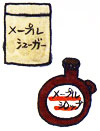 |
The sweet syrup made by boiling the sap of the sugar maple.
This is used instead of sugar in cooking and cake-making.
It is delicious just it as it is, with a very clean aftertaste, and its action on the body is very mild.
|
Mirin, genmai amazaké (pure rice fermented flavouring)
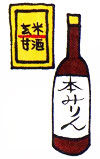 |
Real mirin is used in boiled dishes and other recipes as a hidden flavour.
In contrast to synthetically prepared imitation mirin made with glucose or starch syrup, real mirin is a sweet flavouring with a very nice, clean aftertaste.
Amazaké is like a kind of rice yoghurt. In the Edo Period (1603-1867), it was drunk in Japan as a health drink to prevent heat fatigue in summer.
It is not only drunk on its own, but also used in cake-making.
|
Dried fruits
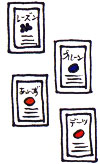 |
Dried fruits, concentrated packets of nutrients made by the power of the sun, are little treasure chests of minerals such as iron and calcium, vitamins, and plant fibre.
If you can buy pesticide-free, non-bleached, non-oil coated and natural sun-dried fruits, they are delicious to eat as they are and are very useful in making cakes.
|
Grain syrup
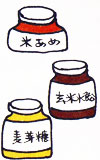 |
A starch syrup made from grains, with about half the sweetness of sugar.
A healthy sweetener with a good balance of essential amino acids and minerals produced by a decomposition reaction of malt enzyme.
Used in various kinds of cooking and cake-making.
|
|
|
Why you should not eat white sugar
|
What is white sugar?
|
The raw material sugar cane juice has all the things like vitamins, minerals, protein, fats, and fibre that have beneficial effects on the body removed, and then the sugar is refined up to about 99.9% purity, rather like some unnatural chemical substance. |
What happens when we put this unnatural white sugar into our bodies?
1. The body shifts towards acidity
When the body becomes acidic, it uses bicarbonate ions to try to neutralize the blood, However, if that is insufficient, a component of bones, calcium carbonate, is used, making the bones and teeth brittle.
A dental hygiene research report from Tohoko University (northeast Japan's primary university, located in Sendai) has confirmed that simply placing sugar gently in the mouth causes the teeth to continue to dissolve for about ten minutes.
2. A trigger for severe atopy (atopic dermatitis)
According to a research report from the Kagoshima University Faculty of Medicine (a university in the southern part of Kyushu), the result of a survey of 200 cases of severe atopic dermatitis showed that, "Those who like and consume large amounts of sweet and oily foods have reduced metabolic capacity in this respect."
3. Cause of sensitivity to cold, muscle stiffness and swelling
After eating sugar, a part of the glucose is not all burned up but is released into the bloodstream as lactose. This blocks the capillary blood vessels in the muscles causing a blood flow problem, which results in sensitivity to cold, and muscle stiffness and swelling.
4. Causes low blood sugar (hypoglycaemia)
If you ingest a large amount of sugar, your blood sugar level will rise very rapidly. Since the body cannot respond effectively to the sudden rise in sugar level, the pancreas secretes a hormone called insulin in order to lower the sugar level. The sugar level now falls very rapidly and overshoots to a low blood sugar state - hypoglycaemia.
|
What hypoglycaemia will do to you
The body, having become hypoglycaemic from ingesting large amounts of sugar, secretes the hormone adrenaline from the adrenal gland in an effort to somehow raise the blood sugar level. This stimulates the liver into releasing a sugar, glycogen. Adrenaline, as you probably know, is sometimes known as the "fight or flee hormone" (in Japan "the angry hormone"), so you are likely to feel aggressive when it is secreted into your bloodstream!
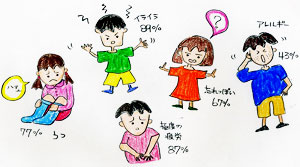 |
<Symptoms caused by hypoglycaemia>
Irritability, extreme fatigue, depression, forgetfulness, allergies, as well as dizziness, headaches, rapid heartbeat, shaking, chills, muscle stiffness, sleepiness, breathing difficulties, insomnia, lethargy, anxiety, phobias, antisocial behaviour, mental derangement, etc.
|
Rough indicators of sweetness
Japanese people are apparently consuming 60g or more of sugar per day, 1.8 kg per month, 21.6 kg per year. (21 kg is roughly the weight of a small primary school child in Japan.) Of this, about 15% is consumed directly as sugar, and the remaining 85% is dissolved in drinks or mixed in with various kinds of food, so we are generally consuming it without really being aware of what we are doing.
 |
Eliminating harm from sugar
1. No eating or drinking of sugar!
Chew 100 times after putting grains (genmai and other grains) in your mouth and before swallowing.
If you continue to do this for one week your body will them know the sweetness that you really need. When you get into the habit of chewing grains and vegetables well when you eat them, your body will be filled with the sugars you need and you will cease to crave for oversweet flavours as in sugar.
2. Change to sugar substitutes
| Harmful white sugar sweetness |
brown sugar
|
maple syrup
|
amazaké
|
grain starch syrup
|
Ideal sweetness grains, vegetables |
|
|
|
|
|
|
honey
|
mirin
|
dried fruits
|
3. Neutralize the harm of sugar
People who love sweet things and end up overeating them can go right ahead!
Miso soup, umeboshi, seaweed, takuan, sesame salt, natural salt, naturally fermented soy sauce, miso and so on
|
|
|


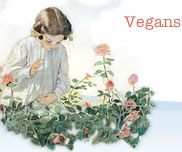









![Vegetarian Recipes [Japanese]](../images/contents01_a.gif)

![Vegetarian Recipes [Chinese]](../images/contents01_b.gif)

![Vegetarian Recipes [European ,etc]](../images/contents01_c.gif)

![Vegetarian Recipes [Sweets]](../images/contents01_d.gif)























![Vegetus Shop [Japanese]](../images/vegetesu_shop.jpg)

![Wakyo Co.,Ltd. [Japanese]](../images/wakyo.jpg)

![Vegetarian Therapy [Japanese]](../images/vegeterian_therapy.jpg)





















